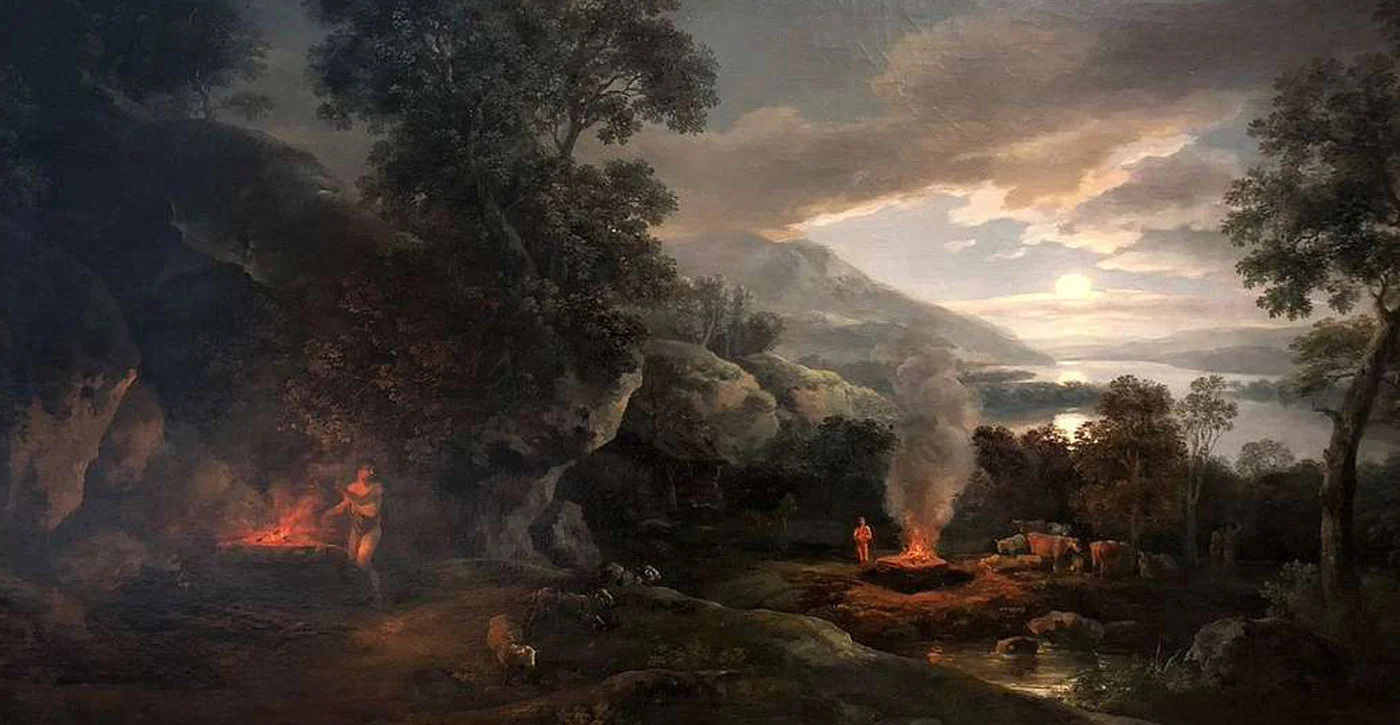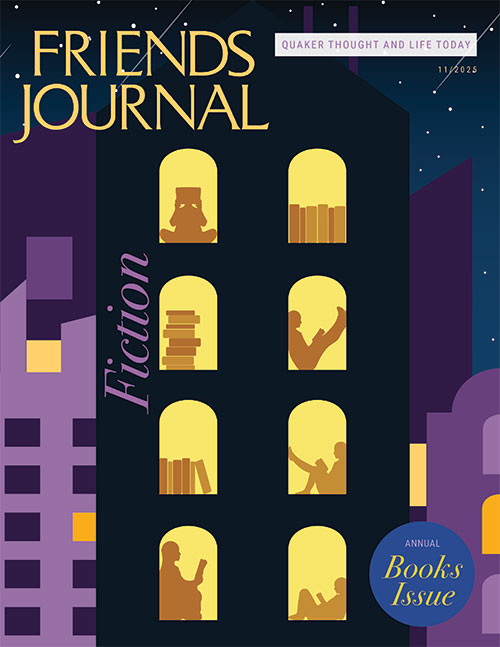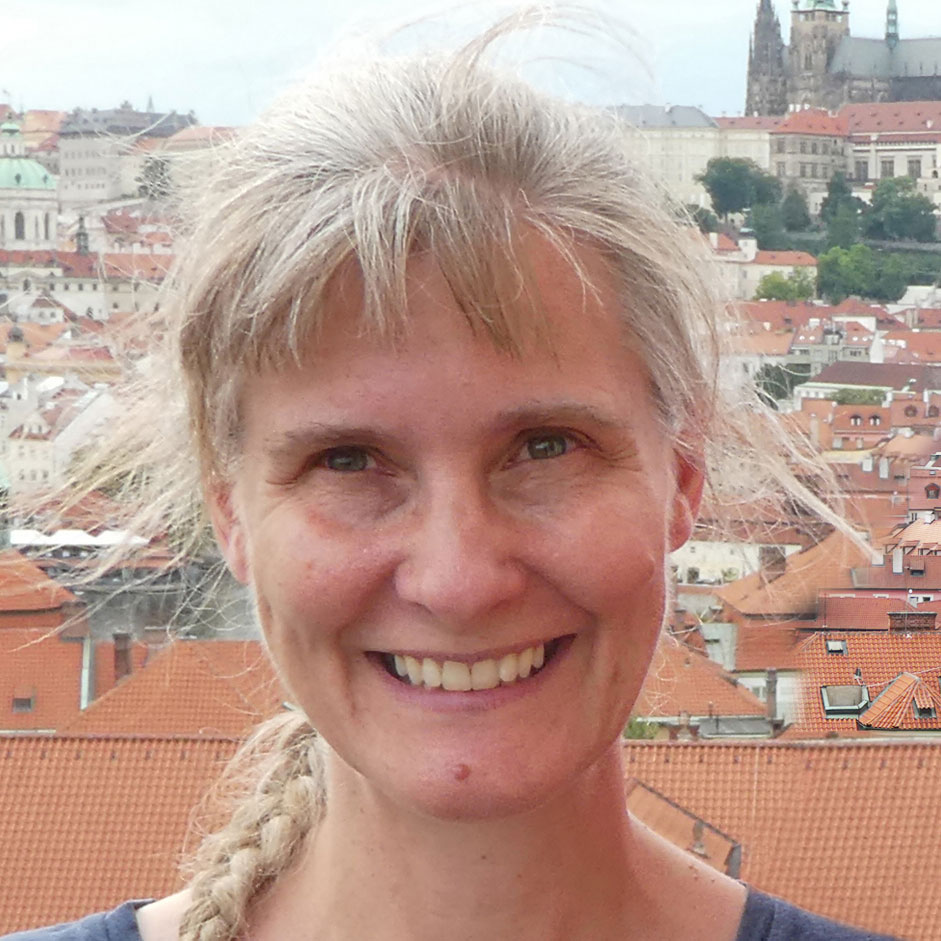Over and over they were born, those brothers, always catching at each other’s heels. It’s true the two were very different: the elder more rugged and active, more brawn than brains, while the younger was smaller and clever, a charmer full of ambitious schemes. Perhaps there were bound to be misunderstandings, being as different as they were, but the first time they were born they got along well enough for a while.
Cain loved the earth, and having never known Eden, he found satisfaction in tilling soil, sowing and tending seedlings, harvesting crops with the sweat of his brow, delighting in nature’s bounty. His younger brother watched the sheep, spending his days sitting, observing, and thinking. Different but not opposed, until the day they ran against that inescapable zero-sum scarcity: they could never both be loved. Both brothers prepared their offerings for their father, different but not opposed, but only one was accepted.
When Cain realized there was no love left for him, how could he find love for another? And without love, baffled and angry, how could he be his brother’s keeper? So their first life led to murder in the field and Abel’s blood crying from the ground. After Cain’s anguished crime, the farmer who loved the earth was denied even earth’s love, and he wandered homeless, replaying their life over and over in his mind, trying to understand why he had not been loved.
In their second life, the rivalry began before they were even reborn. Still in the womb, they recognized each other, and already they were fighting, already knowing the cruel law of their world: two sons but only one blessing, only one share of love. Again Cain strove to win with strength and labor. Something in him remembered that last time when meat had been favored over grain, and he became a hunter, while Abel stayed closer to home. But it made no difference; there was still only one share of love, and while Cain was preparing his offering of venison for their father, Abel stole the love with deception and lies. When Cain came home to discover that he had been deprived a second time, there would have been murder again in this life, except that Abel fled with his stolen blessing. Cain was left once again to make his unblessed home far from earth’s richness, crying out, “Is there no love left for me?” Over and over he replayed their life in his mind, trying to understand.
With such turmoil and agitation, what peace could those spirits have? Without even waiting to die, they were born a third time, still catching at each other’s heels, still struggling like stalks of corn in a drought, their roots striving for insufficient water. Again Cain, born first, worked dutifully, trying to earn the love with his labor, but this time Abel didn’t even have to lie to be given everything. As soon as he was born, he won all the love, expressed for all to see in an extravagant, many-colored robe. Abel grew brash as their story repeated itself. He flaunted his favored status and teased Cain and their other brothers with tales of his superiority: even stars bowed down before the one son who always received that single share of love. Again Cain’s famished heart rose in its bitterness to thoughts of murder. He wanted to tear that hated robe to shreds like a wild beast.
Did Cain in this life remember the details of those other lives that he had replayed over and over in his mind? He had murdered his brother once and lost even the little love he had known. The second time his brother had fled from murder, but even with Abel gone there had been no love for Cain. What Abel couldn’t have, no one could have. Did Cain know this time that murder wouldn’t win him the love he longed for? Something in him may have remembered the pattern, but it wasn’t logic that stayed his hand. For all his baffled rage, his was a farmer’s soul, longing not to kill but to make things grow, and somehow Cain found just enough mercy in himself to reject murder. Still, something in him certainly remembered that last time the love had been stolen with deception and lies, and he thought that perhaps this time he could be the one to succeed with trickery. He sold Abel to a passing caravan and told their father that his brother had been killed by a wild beast. Small mercy, perhaps, to sell a brother into slavery instead of murder, but even that small mercy had been summoned from a pool of love that had never been filled, an empty cistern in the desert of Cain’s drought-stricken heart.
Despite that small mercy and despite the deception, once again Abel’s absence gained Cain no share of love. Once again, the sole blessing went to Abel, who stored it up for himself even in a foreign land, growing rich and powerful. Years passed. A drought came and was followed by famine, and their intertwined spirits, always catching at each other’s heels, led Abel and Cain face-to-face again. Then once again, it was Abel’s deceptions and lies that forced his brother to acknowledge him the victor. And yet, those few drops of love that Cain had found for the brother who had stolen his birthright were just enough to survive the drought. A seed could sprout between them in that pinch of moistened soil, and for the first time, Abel also found a few drops of mercy. He shared some of his hoarded love with his brother and found that there was enough. That third life ended in reconciliation, with Cain and their brothers permitted to live in Abel’s home: no one murdered this time, no one wandering in the wilderness.
Still, old habits die hard. The fourth time they were born, Abel didn’t even pretend. As soon as he was old enough he demanded the birthright. Of course, he was given it, as he always was, and he took the love along with all his clever schemes and travelled to a foreign land. Cain dutifully stayed behind on the farm to work hard, more brawn than brains, always hoping that somehow some love would be left over for him. How could this cycle end but with some variation on the theme of Cain passed over, shamed, and left to live as best he could without that scarce and insufficient love?
In this fourth life, however, Abel did not prosper in his travels as he had before. His audacity did not quite suffice; his clever schemes failed, and this time there were no prophetic dreams, and the famine caught him unprepared. His inheritance squandered, hungrier than he had ever been, Abel returned at last to his father’s home. One thing was the same as ever: the moment he came near he was caught up in his father’s arms and acclaimed again, showered with the love that Cain had still hoped could be his, dressed again in a many-colored robe to represent that love, and feasted with the fatted calf.
When Cain saw the celebration, something in him remembered all the other times that he had been out working, only to discover that while he prepared his offering, the entire share of love had been given to his brother. His heart cried out in anger, and he turned away from his father’s door lest he murder his brother again. He knew that murder wouldn’t help—what Abel couldn’t have, no one could have. But Cain had always been more brawn than brains, never figuring out how to game the system. His younger brother was always one step ahead with his ambitious schemes, and Cain’s attempt at trickery had not helped any more than impassioned violence. Another life, and yet another variation on the theme of Cain left out and denied the bounty of the earth where he had always worked so hard. He turned to leave.
Yet something was different this time. Something had shifted in the years since those brothers had last been born, and this time when their father came out to Cain he did not say, as he always had before, “There is nothing left for you.” This time he said, “Everything I have is yours.”
“How can you say that,” Cain demanded, “when you have given your love to my brother? Did you ever throw a feast for me? Did you ever give me a robe of many colors? Did you ever embrace me and give me your blessing?”
And this time, for the first time, his father caught up Cain in his arms, gave him a magnificent robe of his own, and pulled him into the house to share the feast.
What had changed? What had shifted? When Cain and his father entered, Abel came to them with tears in his eyes. He said, “I’m sorry. I know I did wrong to our family, and yet our father has accepted me back.”
“Of course he has!” cried Cain bitterly. “And now that you’re back to take all the love, there will be nothing for me. I’ll pack my bags.”
What had changed?
Abel said, “I’m not trying to replace you. I’m not worthy to be your brother. If I’m just a hired hand, it will be all that I deserve.”
Their father protested, “But I want you both! I love you both. If my elder son left, I would miss you just as much as I missed your younger brother. There is enough for all.”
What had shifted?
Cain didn’t understand. He was always slower to understand. All he ever wanted was to till soil, sow and tend seedlings, harvest crops with the sweat of his brow, delighting in nature’s bounty. Shaking his head, he followed them to the table spread richly with the foods he had diligently helped to grow. And there was enough.
The fifth time they were born there was so little to tell that you’ve never heard the story. Two brothers were born, the elder more rugged and active, while the younger was smaller and clever. Their father finally learned that there was enough for both, and when he finally loved both, blessed both, promised everything to both, then there was enough for the brothers to love each other, too. There was no murder, no deception. Both brothers worked hard, sharing their complementary talents with each other. Both brothers thrived. The fifth time they were born, they loved each other, each the other’s keeper, and they lived happily ever after. Who tells a story like that?
They will be born again, no doubt, but you probably won’t hear about it. They will be the ones who lift each other up, and being lifted, have strength to share. They will be the ones who know that there can always be enough love, and they will pour it out around them wherever they go. Their story will be quiet, undramatic, and uncelebrated, but it will shift the stories of those around them. In all their lives going forward, over and over, those brothers will be the ones who change the trajectories of other troubled souls on earth, not through murder or deceit but because in every life, in every age, something inside them will always remember that love is infinite. Perhaps you’ll meet them some time in your life when you need that love yourself, and when your story needs to be shifted and changed. Or perhaps they’ll be reborn in you, and something inside you will remember that infinite, overflowing love.





Comments on Friendsjournal.org may be used in the Forum of the print magazine and may be edited for length and clarity.